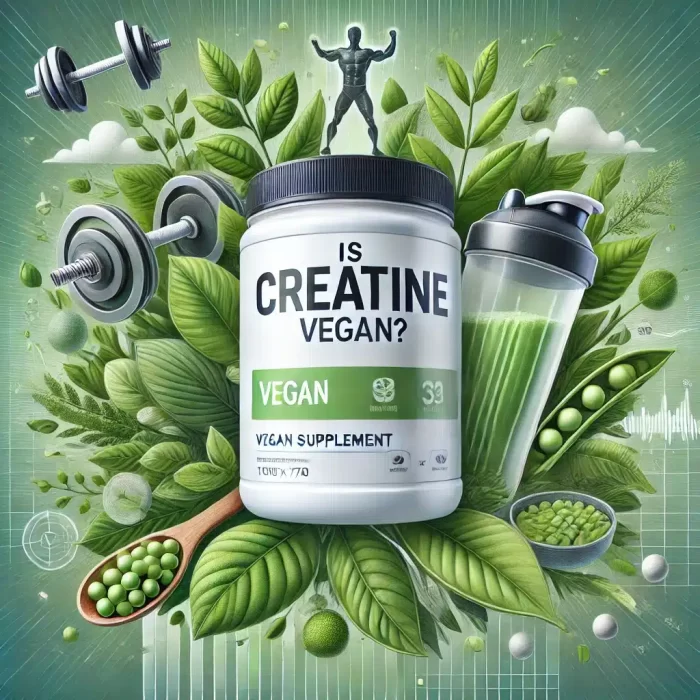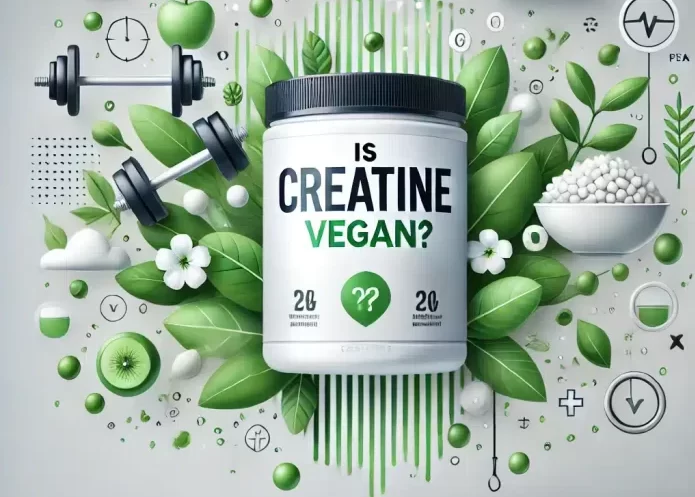Is Creatine Vegan? A Complete Guide for Plant-Based Athletes
Creatine is one of the fitness industry’s most popular and researched supplements. It is one of three performance supplements popular among gym-goers, as they contribute to increasing strength, muscle growth, and exercise performance. But if you follow a plant-based diet, you may be asking: Is creatine vegan?
With plant-based diets, based on ethical, environmental, and health concerns, growing in popularity, the demand for vegan supplements has grown exponentially. Natural creatine-rich sources can only be found in animal products and animal muscle tissue/muscle tissue, so vegans and vegetarians commonly have lower concentrations of creatine in their bodies. This raises the question of whether they should use creatine supplements and — more importantly — whether the supplements out there fit within the framework of a plant-based diet.
This guide examines where creatine comes from and if this is something suitable for vegans, as well as how to ensure you opt for a wholly vegan-friendly variant. We will be discussing vegan creatine benefits, vegan creatine brands, and how to consume it for both your health and performance.
So here is everything you should know about creatine and whether it’s right for a vegan diet.
Is Creatine Vegan?
Yes, creatine is vegan! This is great news if you are following a plant-based lifestyle. Genetic Engineering Institute Sourced from the pristine water found in over 100 fresh-water springs in North America, most creatine products are made from synthetic, non-animal ingredients such as sarcosine (derived from acetic acid) and cyanamide (a member of the organic compound family). Creatine monohydrate is manufactured synthetically; however, it plays its role in a way that is the same in chemical structure as the creatine already exists organically within the body. So it’s perfectly aligned with vegan diets.
But although creatine itself is a vegan substance, not every creatine product is completely animal-component-free. Certain supplements may contain additives, flavorings, or fillers from non-vegan sources. For instance, rather than being vegan, capsules may sometimes be made from gelatin, which is animal collagen. Thoroughly check the product label and ingredient list. To follow plant-based standards, choose those labeled as vegan, or certified by reputable bodies like the Vegan Society.
On the other hand, veganism is gaining popularity and many reputable manufacturers produce creatine with animal-clean compositions, which effortlessly swim in the vegan products pool. The majority of such brands carry vegan certifications and declare significant transparency regarding the manufacturing process, so you know for sure you have made the right choice. Enjoy top-grade performance-enhancing attributes of creatine without harm to your diet and moral values with plant-based food complement.
Why Do Vegans Need Creatine?

Vegans generally have much different baseline levels of creatine than meat eaters and consuming creatine supplements can directly affect athletic performance, recovery, and overall muscle function. Creatine comes from animal-derived foods; it can be found in red meat, fish, and poultry, but no plant foods contain creatine. This makes supplementation particularly important for the vegan diet. These are the – main reasons that creatine will be beneficial to plant-based people:
- Supplementing for athletic performance: Because creatine increases the amount of adenosine triphosphate (ATP) available in muscle cells, ATP production is more efficient. For vegans, who were already the least creatine-endowed group because of their diet, supplementation is the only thing that allows them to take advantage of the anaerobic performance boost for weightlifting, sprinting, or CrossFit. It allows plant-based athletes to lift more weight, train longer, and recover faster between sets.
- Promoting Muscle Growth: This is where creatine comes in, as a key driver of muscle hypertrophy. It allows muscles to hold in water, which allows for a hydrated environment, thereby facilitating protein synthesis and muscle recovery. Creatine also offers another source of fuel to avoid the disappointing realization many vegans have after inspecting their nutritional intake, and can help vegans and other individuals achieve maximum muscle growth from resistance training.
- Enhancing Cognitive Function: Creatine is not only great for physical performance, but it also aids brain health. Research demonstrates that creatine supplementation improves cognitive function, particularly memory, focus, and reasoning. This is particularly true for vegans and vegetarians whose dietary habits may already leave them with lower levels of brain creatine. Creatine can help sharpen mental clarity and reduce cognitive fatigue.
- Speeding Up Recovery: Intensive exercise damages muscles inducing inflammation resulting in delayed beginning muscle soreness (DOMS). This counteracts these effects of oxidative stress and reduces its effects on repair time. It enables vegan athletes to recover faster and train more often without burning out.
- Filling the Dietary Gap: Creatine supplementation compensates for dietary creatine that is missing for vegans. This extracted creatine will provide the same muscle replenishment benefits as that of vegan-friendly protocols, equalizing performance, endurance, and recovery traits between those who consume, and those who do not consume animal protein.
How to Choose a Vegan Creatine Supplement?
Selecting the appropriate creatine supplement is crucial for guaranteeing it matches your nutritional requirements and exercise objectives. Here’s what to look for:
Type of Creatine:
Creatine Monohydrate: This is the most researched and effective form of creatine. Creatine monohydrate is virtually always vegan. It also has good bioavailability and is what most athletes will go for.
Other forms, including creatine hydrochloride (HCl) and creatine ethyl ester, are likely vegan, though they don’t have the same amount of evidence to support their use as creatine monohydrate.
Purity and Additives:
Look for those marketed as “100% pure creatine monohydrate.” Steer clear of products with fillers that serve no purpose, added flavors, or colors that could bend the vegan rules. If a brand makes a point to show that its product has been tested for purity by a third party, you’re less likely to have creepy crawlies.
Certifications:
Choose vegan-certified products, which ensure no animal-derived ingredients have been used. Certifications from groups such as the Vegan Society or similar logos give you added comfort.
Capsules vs. Powder:
If you opt for creatine capsules, make sure the capsules are constructed from vegetable cellulose, not gelatin. Creatine powder tends to be less complicated since powdered creatine is often void of animal parts.
How to Use Creatine as a Vegan?
Incorporating creatine into your daily routine as a vegan is both simple and highly effective. Proper usage ensures you get the full benefits of this powerful supplement, from improved athletic performance to enhanced muscle recovery. Below is a step-by-step guide on how to make the most of creatine as a plant-based athlete:
- Understand the Dosage:
- Creatine monohydrate typically calls for a daily dose of between 3-5 grams, so it is quick to measure out and add to your routine. That is enough to keep your muscles fully saturated with creatine, which is when most performance and recovery benefits will occur.
- If you’re just getting started with creatine, try a loading phase to more quickly saturate your muscles. That includes an intense phase of 20 grams a day (in 4 portions) for 5 to 7 days, then a maintenance dose of 3 to 5 grams a day. The loading phase isn’t required, but it can give you faster results.
- Timing Matters But Not Much:
- Creatine timing is very flexible. You can take it whenever you want in the day because the benefits of magnesium come from regular use, not immediate absorption.
- That said, a lot of athletes like taking creatine after a workout, when muscles are ready to absorb nutrients. Insulin shuttles creatine into muscle cells, so consuming it with a meal or shake rich in carbohydrates will improve its uptake.
- Mixing and Consumption:
- Since creatine is tasteless and easily dissolves, it is easy to add creatine to the beverages you like. Most people take it mixed with water, but you can also integrate it into smoothies or plant-based protein shakes and even juice for extra convenience and flavor.
- If you are going for powdered creatine, then make sure that you mix it properly to avoid any crunchiness. Creatine monohydrate is also water-soluble (higher-grade creatine can dissolve easier as well), which makes it easier to mix with other substances in drinks.
- Stay Hydrated:
- Creatine causes your muscles to retain water, which improves hydration and performance. But this also means you may need to drink more water during the day to stay hydrated. Drinking plenty of water is also important to avoid dehydration or cramping in the middle of workouts.
- Consistency is Key:
- Creatine truly shines with regular, long-term use. Compared with some supplements with immediate effects, creatine accumulates within your muscle cells over time. On training or rest days, make it part of your daily routine to keep your muscle stores saturated and ready to act.
- Combine with a Balanced Diet:
- Creatine is a highly effective supplement, but it works best in conjunction with a balanced diet with plant-based proteins, whole grains, and healthy fats. This gives your body the nutrients it needs to repair and grow muscle while creatine enhances your performance.
- Consider Cycling (Optional):
- Creatine does not have to be cycled for safety or effectiveness, yet some athletes prefer to take breaks for their personal preference. A traditional method is to take creatine for 8-12 weeks and then take a break for 4 weeks. That is optional and for personal goals.
Vegan-Friendly Tips for Maximizing Creatine Use
Creatine is an effective and well-studied supplement that may improve athletic performance, increase muscle growth, and enhance recovery. One aspect of vegetarian and vegan creatine that you should make sure of is that they are suitable for your dietary and ethical consciousness. So to enable a look at maximizing the biological activity of creatine with veganism in mind, here are some feasibly practical tips, that also allow you to maximize the effectiveness of creatine and stay true to your lifestyle.
1. Use Certified Vegan Creatine
Choosing a certified vegan product is the first step to taking the most effective creatine as a vegan. Most creatine supplements are synthetically made and technically vegan, but some can contain animal-derived additives, fillers, or gelatin-based capsules. Choose a product that specifically uses the term vegan-certified so you know they uphold the plant-based standard.
- What to Look For: Look for labels such as “vegan-certified” or “plant-based” on the packaging. Credible brands will usually provide this information and may also have third-party certifications from groups such as the Vegan Society.
- Why It’s Important: Certified vegan creatine ensures that there aren’t any animal-derived components, so your supplement is as much in line with your health goals as it is with your ethics. With such transparency, you can better focus on hitting your fitness goals without the concern of hidden ingredients.
Also, focus on the creatine expiring date!
2. Track Your Progress
An extremely efficient way to get the most out of creatine is by tracking your progress over weeks. Tracking your performance, endurance, strength, and recovery is important; it can help give you a sense of how well creatine works for you as well as whether you need to modify your supplementation or training.
- Performance Metrics: Look for measurable gains in things like the total amount of weight lifted, increase in speed on a squat, and more. Creatine, of course, will be most effective in high-intensity, short-duration exercise, so make sure you are paying attention to progress there.
- Recovery Insights: Keep track of the speed at which your muscles recover after hard training sessions. Less soreness and a faster transition into the next workout are good signs that creatine is working.
- Adjustments: Tailor your creatine based on the data you collect. If you start noticing a slower recovery or plateaus in performance (you’ll have to assess this based on your previous experiences), you may try to play around with the dosage or pair it with other supplements for better results.
3. Pair with Other Vegan Supplements
Creatine alone is a powerful supplement, but it can work wonders in combination with other complementary vegan-friendly supplements to supercharge your training. Below are these combinations that guarantee your body the proper fuel for post-workout muscle recovery, growth, and performance:
- Plant-Based Protein Powders — Protein is important for muscle repair and growth and combining creatine with a quality plant-based protein powder ensures that your body has the building blocks it requires. Choose those made with pea, rice, or hemp protein, which are high in essential amino acids.
- Branched-Chain Amino Acids (BCAAs) — BCAAs (leucine, isoleucine, and valine) are specifically successful in reducing muscle fatigue as well as aiding recovery. BCAA supplementation on top of creatine intake post-workout is a great addition to the muscle-building arsenal.
- Electrolytes: The use of creatine increases the water content in your muscles and as the level of water in the body increases, it is very important to maintain hydration. No more wasting your money on just good old water, an electrolyte supplement helps keep you hydrated which is essential for energy levels and muscle function when training.
- Beta-Alanine: A vegan-friendly supplement, Beta-alanine helps to decrease muscle fatigue during extended training sessions. Synthesized with creatine, it aids endurance-enhanced workouts and builds training capacity.
Highly Recommended Vegan-Friendly Creatine Supplements:
Buy vegan creatine supplement filming in the quality, purity, transparency of the ingredients and the manufacturing process Here are some of the best vegan creatines in terms of quality and benefits, tailored to your health and fitness goals:
Naked Creatine:
If you’re a plant-based athlete — Naked Creatine is a better option. No artificial ingredients; pure creatine monohydrate with no additives. Its high-quality, all-natural formula and simple composition make it an ideal option for those looking for a clean and effective supplement.
- Vegan Certification: Naked Creatine is proudly vegan-certified, confirming it complies with plant-based dietary standards.
- Every batch of this product is put through rigorous third-party testing to ensure purity, potency, and safety.
- Mixability: Its micronized, fine powder mixes smoothly into any water, shake, or smoothie, so it’s easy to add to your day-to-day.
- Best For: This is a straightforward, effective creatine for athletes who want transparency and clean ingredients — Naked is about as no-nonsense as you can get.
Bulk Powders Creatine Monohydrate
For those of you worried about budget but still want a good quality creatine monohydrate without sacrificing performance or purity then try Bulk Powders. This supplement is designed for athletes of all levels, providing the benefits of creatine without the hefty price tag.
- Vegan-Certified: While the bags are not explicitly labeled vegan, Bulk Powders creatine monohydrate is made without any ingredients derived from animals.
- Value Based On Money: Larger servings and competitive prices, make it an ideal option for those looking for affordable yet quality food.
- Ease of use: Its powdered structure mixes seamlessly into drinks and is easy to use daily.
- Who It’s Best For: Cost-conscious athletes seeking a no-frills, no-waste creatine supplement.
My Protein Creatine:
MyProtein is an established brand that specializes in high-quality sports supplements. This creatine monohydrate is vegan-certified and an effective yet affordable option.
- Suitable for Vegans: If you are living a vegan lifestyle, this creatine powder clearly states that it is vegan-friendly.
- Scientifically Proven: Supported scientifically, my protein’s creatine monohydrate guarantees superior strength, stamina, and recovery.
- Micronization for Increased Levels of Bioavailability: Its very fine texture makes absorption faster and easier so that every serving can be the most beneficial.
- Who It’s Best For: Athletes who prefer a creatine supplement that’s also vegan, and want a value-driven product.
Micronized Creatine By Optimum Nutrition
Optimum Nutrition: It is one of the reliable and household-name fitness supplement brands that manufactures quality supplements in all possible sports. Their micronized creatine is not marketed as vegan, however, it does contain 100% pure creatine monohydrate and comes with no animal-derived ingredients.
- Liquid Micronized: Our microns are so small (micronized) that they mix extremely well into liquids.
- Trusted Source: Optimum Nutrition has established a solid reputation for quality over the years, making this a safe bet for fitness fans.
- Clean Ingredients: The product avoids unnecessary fillers or additives, providing pure creatine as intended.
- Who It’s Best For: Someone who wants a well-known brand yet doesn’t need explicit vegan labeling but also prefers a clean, effective product.
Common Questions About Vegan Creatine:
Is creatine naturally present in any vegan foods?
Creatine doesn’t naturally appear in plant-based foods. The body can produce some creatine, but for vegans, supplementation is the best way to keep levels high.
Are all creatine supplements vegan?
Creatine supplements are mostly vegan because they are synthetically made. That said, always read the label in case of added ingredients or certifications to make sure the product works with your eating preferences.
Can creatine support a plant-based athlete’s performance?
And the answer is yes; vegan athletes taking creatine can improve strength, endurance, and recovery, allowing them to perform optimally.
Are there any side effects of creatine for vegans?
Creatine is usually safe when consumed in an appropriate amount. Before progressing to this threshold, minor side effects such as bloating may happen but if you always stay hydrated and consume anywhere between 3-5 grams a day this risk is practically eliminated.
Final Thoughts: Is Creatine Vegan?
So, creatine supplements are vegan, which is a great choice for plant-based athletes. Whether you want better performance, additional muscle growth, faster recovery, or enhanced cognitive function, creatine has scientific evidence to support your goal. With the right dose of quality vegan-certified creatine in your daily routine — you can hit the fitness goals you set for yourself and still adhere to your dietary principles.
Creatine fills in the gaps of vegans and vegetarians making it easier for them to maximize energy production and performance both mentally and physically. With so many vegan-friendly options to choose from, there’s no reason to miss out on this powerful supplement.






